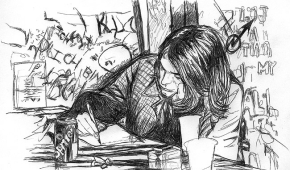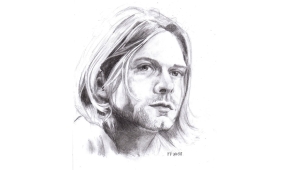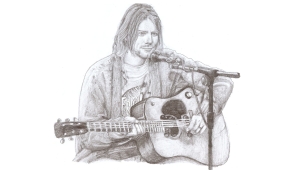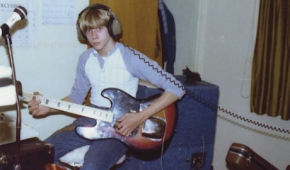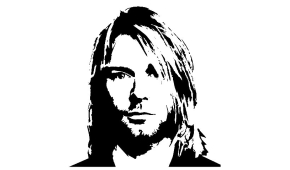October 26, 1991 - San Francisco, CA, US
Nirvana, Nirvana, Nirvana!!
I have a lot of respect for words, the power of words. I have so much love and respect for poetry, that it's something I have to do myself for myself without other influences.
To the thousands already inside San Francisco's Warfield Theatre, not to
mention the hundreds outside pleading, begging and paying up to ten times the
official ticket price of $13.00 from "scalpers" to get the chance to experience
Nirvana the band, the concept means rock. Hard rock. And serious fun.
Greater and louder than the sum of its three parts, guitarist/ vocalist Kurt
Cobain, bassist Chris Novoselic and drummer David Grohl, this rock'n'roll
trinity of noise, melody and anti-apathetic lyricism brought their Sub Pop-based
ethic to the big stage, the big label and the big crowd. All in a very big way.
The people had come for Nirvana, currently the newest, fastest-rising star of
the underground, crossing over from alternative listeners into thrash's
head-bangers and moshers and, along the way, into rock'n'roll's major leagues.
Their record company is stunned: "This record came out of nowhere. It's selling
and everybody is talking about it, the shows are sold out, and it's all happened
in the past month. It's incredible. They're gonna be huge all over the world."
Nirvana is punk. Arising - like Queensryche, Alice in Chains, Mother Love Bone,
Pearl Jam and Mudhoney - from the fecund grounds of the rain-soaked Northwest
(Seattle, Washington, to be exact), Nirvana has a sound and sensibility that
matches the punk movement of the depressed north of England and lowlands of
Scotland. Indeed, "Punk is musical freedom," proclaims guitarist-singer Kurt
Cobain. "It's saying, doing and playing what you want. In (dictionary) terms
'nirvana' means freedom from pain, suffering and the external world, and that's
close to my definition of punk rock." The following interview was conducted
informally with Kurt Cobain, the poet/singer/ guitarist at a private party set
up by the band's friends.
Q: Welcome to the Big Time! Did you ever think it would
come to this?
KURT: This is our first album and tour. We've done the on-the-road slugfest
too many times to mention - the "band in a van" routine, you know. So, for
some people it's like we came out of nowhere, whereas for us it's like we've
always been right here. We just got lucky one more time. A lot of the faces
here tonight have seen us before. I talked to a lot of people who saw us
with Mudhoney at the Kennel Club and with Dinosaur Jr. It's just gone up to
another level. It's always been out of our control, the music itself and
what goes on around us. Somebody at a convention called Nirvana the "new"
Dinosaur Jr! Does that mean we could then be the next R.E.M.? No, man! We're
Nirvana, and we just want to have fun. We're all about fun - at least, to
us.
Q: What about the production on this album?
KURT: I think we still sound like us - unmistakably Nirvana. Having
different ideas, getting the chance to talk about stuff with somebody else
who's not in the band, can be good, as long as you're doing what feels right
to you. You know if it's bullshit, if you're being taken. On the other hand,
"Smells Like Teen Spirit" is getting airplay, a lot of airplay. People are
coming to shows on the strength of one song. I guess that's the way it goes.
It's cool, we can deal with it. Everybody seems to be leaving smiling and
sweaty.
Q: Do you still see yourselves as an "alternative", underground band?
KURT: What's alternative? What's counterculture? What's cool? Who knows? Who
cares? If chasing cool is important to you, you're an idiot! What can you
say about people who wait to be told what to like, what to do and how to do
it? It's like apathy in action. In an insular situation, like college, where
they actually reduce the input of ideas on some levels while they sell you
on the idea that you're actually getting more, and then you believe it in
the end. It's so easy. Most of the people who claim to be pursuing a higher
education are just as much followers as those they look down on. I see lots
of people come out of the systems - educational, social and business -
thinking about nobody but themselves, but they're still able to tell
themselves that they're basically OK, that they just reflect what's around
them. It just goes to show, if you work at it, you can justify anything.
Look at the mediocrity and blatantly unacceptable stuff we do to each other
and the planet. Look at what we accept in our lives by just saying it's out
of our control, we can't do anything about it, and it's not our fault. I'm
not into ambition or salesmanship, we're not some new trend. We never meant
or tried to be cool, or be a "buzz" band. It never even entered our minds.
Q: It's apathy that's the most dangerous for society - the banality of evil.
Letting evil exist, without fighting back.
KURT: "Teen Spirit" specifically, and other songs we do, deal with that. We
just did a benefit show with Sister Double for an AIDS foundation. We and
you can do so much more. I'm disgusted by my own and my generation's apathy.
I'm disgusted at what we allow to go on, by how spineless, lethargic and
guilty we are of not standing up against racism, sexism and all those other
"isms" that the counterculture has been whining about for years while they
sit and enforce those same attitudes every night on their televisions and in
the magazines. It's the ism-attack bought off by consumerism. It's a sweet
thing, and we buy into it deeper every day.
Q: Yeah, I agree. But, nonetheless, records are products; rents and salaries
have to be paid. That's not another justification, but everyone has to plot
their own path through the mine field, so to speak.
KURT: Yeah! That's exactly what I'm saying. I'm not into ambition or
salesmanship. We're not some new trend, haircut, or anything like that.
Q: This is your first headlining tour supported by major record company's
dollars. It's the Nirvana show complete with support bands on tour with you.
It's got to be somewhat different for you.
KURT: Yeah, the hotel rooms, the transportation, more room to spread out....
But we're pretty far removed from all that corporate thing. We like playing
live, we've always done it, and the support sometimes makes it easier to
just concentrate on playing.
Q: For Nirvana's lyrics, you cull from your own poetry....
KURT: I don't understand anything technical about music at all. I don't
understand any of it, why you can't put these sounds together with those
sounds. I only know what sounds good to us. I, or we as a band, never really
copied anybody or spent time learning other people's songs. We were never
good enough or had the patience to do it! So we put that energy into putting
our own stuff together. We're from the learn-as-you-play school. We're still
in it. Oh, yeah, I learned the official rock anthem "Louie Louie," that and
a (Rolling] Stones song or two, maybe. I write poems for myself and I write
poetry that gets torn apart and becomes songs. I have a lot of respect for
words, the power of words. I have so much love and respect for poetry, that
it's something I have to do myself for myself without other influences. I
don't want to mention favorite poets, what few I have, because I think that
world should be discovered by you alone. Besides, few contemporary poets do
much for me.
Q: So music and lyrics are something very personal to you on many levels. Do
you think that extends to your audience?
KURT: Yeah, I think it does, not just what we think but how other people
will play a line off another, just like I do. I'm still the guy sitting in
his room at 3:00 a.m. playing guitar and writing stuff because there's
nothing else to do and no one to say it to. I think people can feel that,
that we aren't much different than them. And we're not.
